

For this resource centre, we will be focusing on why emerging adults face stress, along with various coping mechanisms to counter this stress. The Basics of Stress. Stress is a situation that triggers a particular biological response.
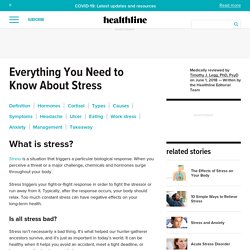
When you perceive a threat or a major challenge, chemicals and hormones surge throughout your body. Stress triggers your fight-or-flight response in order to fight the stressor or run away from it. Typically, after the response occurs, your body should relax. "The effects of emerging adulthood on stress and depression" by Christine Cusack and Christopher Merchant. Periodical Title Modern Psychological Studies Publisher University of Tennessee at Chattanooga Place of Publication Chattanooga (Tenn.)
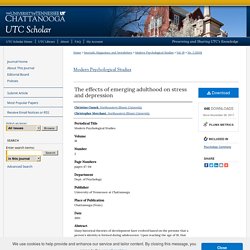
Abstract Many historical theories of development have evolved based on the premise that a person's identity is formed during adolescence. Call Number BF1 .M63 v. 18 no. 2 2013 Rights Recommended Citation Cusack, Christine and Merchant, Christopher (2013) "The effects of emerging adulthood on stress and depression," Modern Psychological Studies: Vol. 18 : No. 2 , Article 6.
Young Adulthood and Avoiding Lifestyle Stress. Source: Carl Pickhardt Ph.D.
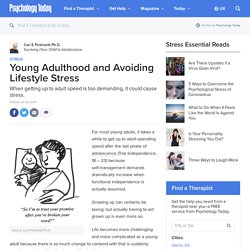
For most young adults, it takes a while to get up to adult-operating speed after the last phase of adolescence (Trial Independence, 18 – 23) because self-management demands dramatically increase when functional independence is actually assumed. Growing up can certainly be taxing; but actually having to act grown up is even more so. article continues after advertisement Life becomes more challenging and more complicated as a young adult because there is so much change to contend with that is suddenly upsetting and resetting the terms of their existence.
There are jarring START/STOP Adjustments -- starting something new like earning a livelihood and stopping something old like forsaking the conveniences of living at home. And now the young person can feel caught in a classic MORE/LESS Squeeze. Stress: Physical and Psychological Impact on Emerging Adults. Section 1, Article 4 - Although emerging adults generally enjoy excellent physical health, the same cannot be said for their psychological health; the incidence of psychopathology among this age group is significant ().
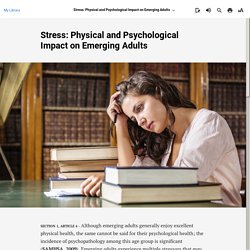
Emerging adults experience multiple stressors that may result in psychological disorders, particularly in individuals that have pre-existing vulnerabilities. Some disorders may start in childhood and progress into adolescence and emerging adulthood, while others may not start until emerging adulthood. Increased sexual freedom during emerging adulthood has been suggested as a primary cause of anxiety, depression, and disease. In addition, lack of parental involvement has been identified as another possible reason for the increasing rate of psychopathology in emerging adults. Moreover, the stress associated with college life and finding steady employment has been suggested as another potential cause. Tendency to stress easily in early adulthood linked to high blood pressure in later life. A tendency to become easily stressed during early adulthood is linked to a heightened risk of developing high blood pressure in later life, suggests a large study of military conscripts, published online in the journal Heart.
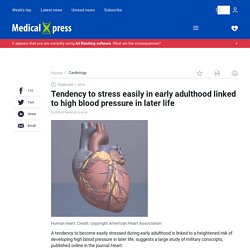
Susceptibility to stress seems to account for more cases of high blood pressure among those who are overweight in their youth, the results suggest. Greater reactivity to stress has been associated with a heightened risk of developing high blood pressure, but no research has assessed the potential impact of low stress resilience—the ability to cope well with stress—in early adulthood on the risk of high blood pressure in later life. The researchers therefore used national disease registry data to track the health of more than 1.5 million 18 year old men, who had been conscripted into the army in Sweden between 1969 and 1997, until the end of 2012. Between 1969 and 2012, some 93,000 of the conscripts were diagnosed with high blood pressure. Journal information:Heart. Tips for Coping with Stress. After a traumatic event, it is normal to feel anxious about your safety and security.
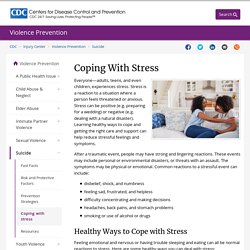
Even if you were not directly involved, you may worry about whether this type of event may someday affect you. Check out the tips below for some ideas to help deal with these fears. Talk to and stay connected to others. This might be: Parents, or other relativesFriendsTeachersCoachFamily doctorMember of your place of worshipTalking with someone can help you make sense out of your experience and figure out ways to feel better. If you are not sure where to turn, call your local crisis intervention center or a national hotline.Get active. Happy Hormones: What They Are and How to Boost Them. Hormones are chemicals produced by different glands across your body.
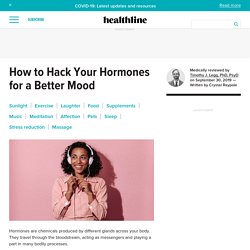
They travel through the bloodstream, acting as messengers and playing a part in many bodily processes. Reduce Stress: Interior Paint Colors that Will Change Your Life. In a world that's moving faster than we can keep up with, it's important to find time to slow down, sit back, and relax.

If you're constantly on the go-getting everyone out the door in the morning, dropping the kids off at school, working late, picking up the dry cleaning, grocery shopping, cleaning, taking the dog to the vet, getting your workout in, and cooking dinner for the family-then you're probably longing for at least 10 minute a day to relax. The good news is you won't have to travel far (although a beach vacation would be nice) to take a breather. You can do it in the comfort of your own home. How?